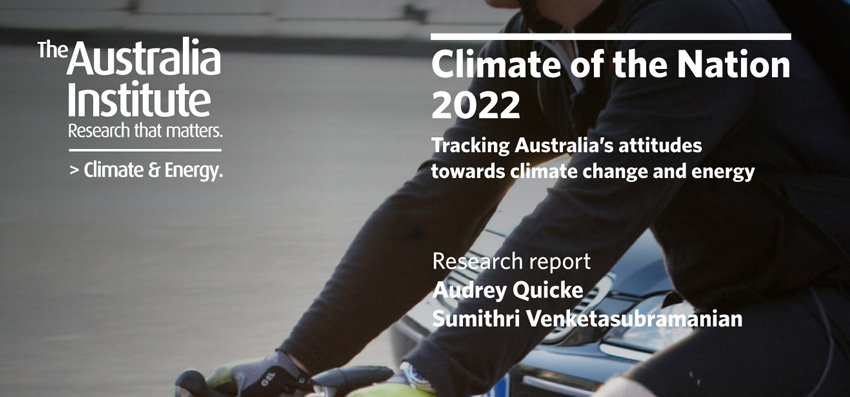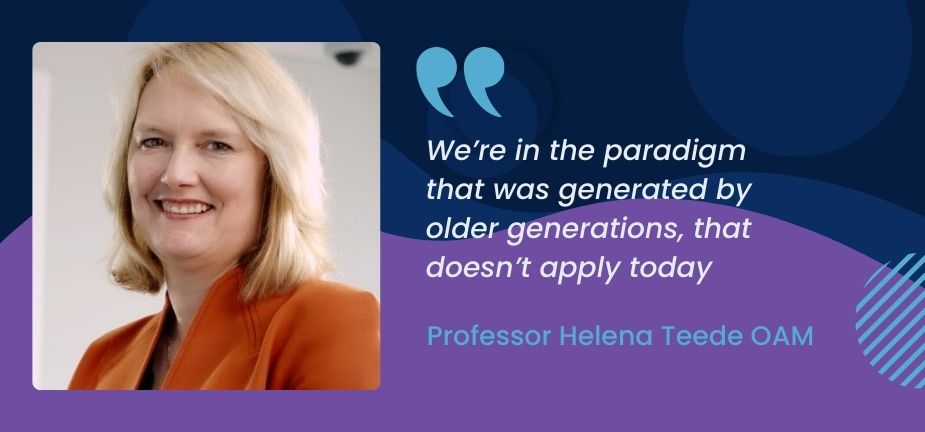The Australia Institute’s annual Climate of the Nation Report provides a comprehensive account of changing Australian beliefs and attitudes towards climate change, including its causes, impacts and solutions. For the first time, Climate of the Nation 2022 includes a chapter on Australians’ views on transport solutions, including quantitative polling and qualitative focus group studies.
Tracking Australia’s attitudes towards climate change and energy [Extract]
Climate of the Nation 2022 shows that concern about climate change remains at an all-time high and there is broad support for a range of decarbonisation policies and climate actions.
Concern about climate change remains at record high
Three-quarters (75%) of Australians are concerned about climate change, the same level of concern seen in 2021 and the highest since Climate of the Nation began. The intensity of concern has increased as well, with record high levels of those who are ‘very concerned’ about climate change (42%).
The top three climate impacts of concern are more droughts and flooding affecting crop production and food supply (83%), more bushfires (83%), and the extinction of animal and plant species (80%).
Support for phase out of coal power
Four-fifths (79%) of Australians believe that Australia’s coal- fired power stations should be phased out, including half (49%) who think they should be phased out gradually and 31% who think they should be phased out as soon as possible. Across all political affiliations, respondents are more likely to think coal- fired power stations should be phased out than be kept running for as long as possible or never replaced by other power sources. Almost two-thirds (65%) of Australians want coal-fired power generation completely ended within the next 20 years, including 38% who want it ended within the next decade.
Electricity price rises blamed on privatisation, excessive profit margins and excessive gas exports
The rising cost of electricity and gas was in the spotlight for much of 2022. Most Australians blame increasing electricity prices on the privatisation of electricity generation and supply (48%), excessive profit margins of electricity companies (46%), or excessive gas exports making domestic gas really expensive (42%). Almost two-thirds (64%) agree that failure by the market to prepare for a transition away from fossil fuels has led to electricity price increases, including 31% that strongly agree.
Support for not approving new gas, coal or oil projects
The International Energy Agency (IEA) pathway says that no new fossil fuel projects should be approved in order to avoid ‘the worst effects of climate change’ by limiting global temperature rise to 1.5°C. A majority of Australians (57%) support Australia following the IEA pathway, to not approve any new gas, coal or oil projects.
Two-thirds (64%) of Australians support stopping new coal mines. One-quarter (26%) want new coal mines to be allowed, including 6% who support using taxpayer funds to subsidise them. Three-quarters (73%) think Australian governments should plan to phase out coal mining and transition into other industries.
by Audrey Quicke and Sumithri Venketasubramanian
View original post and full report.
Associate Professor Magdalena Simonis AM is the Immediate Past President of the AFMW (2020-2023), former President of VMWS (2013 & 2017-2020) and current AFMW National Coordinator (2024-2026). She is a full time clinician who also holds positions on several not for profit organisations, driven by her passion for bridging gaps across the health sector. She is a leading women’s health expert, keynote speaker, climate change and gender equity advocate and government advisor.
Magdalena was awarded a lifetime membership of the RACGP for her contributions which include past chair of Women in General Practice, longstanding contribution to the RACGP Expert Committee Quality Care, the RACGP eHealth Expert Committee. She is regularly invited to comment on primary care research though mainstream and medical media and contributes articles on various health issues through newsGP and other publications.
Magdalena has represented the RACGP at senate enquiries and has worked on several National Health Framework reviews. She is author of the RACGP Guide on Female Genital Cosmetic Surgery and co-reviewer of the RACGP Red Book Women’s Health Chapter, and reviewer of the RACGP White book
Both an RACGP examiner and University examiner, she undertakes general practice research and is a GP Educator with the Safer Families Centre of Research Excellence, which develops education tools to assist the primary care sector identify, respond to and manage family violence . Roles outside of RACGP include the Strategy and Policy Committee for Breast Cancer Network Australia, Board Director of the Melbourne University Teaching Health Clinics and the elected GP representative to the AMA Federal Council. In 2022. she was award the AMA (Vic) Patrick Pritzwald-Steggman Award 2022, which celebrates a doctor who has made an exceptional contribution to the wellbeing of their colleagues and the community and was listed as Women’s Agenda 2022 finalist for Emerging Leader in Health.
Magdalena has presented at the United Nations as part of the Australian Assembly and was appointed the Australian representative to the World Health Organisation, World Assembly on COVID 19, by the Medical Women’s International Association (MWIA) in 2021. In 2023, A/Professor Simonis was included on the King’s COVID-19 Champion’s list and was also awarded a Member (AM) in the General Division for significant service to medicine through a range of roles and to women’s health.










